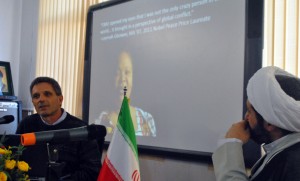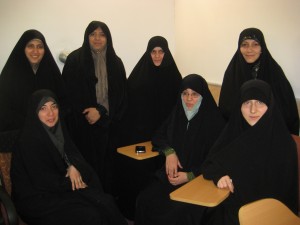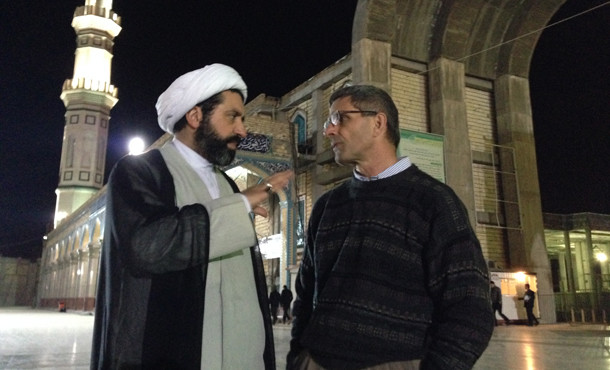J. Daryl Byler’s 11th trip to Iran marks the culmination of nearly a quarter-century of bridge-building efforts between North American Mennonites and Iranians.
Byler, who is executive director of the Center for Justice and Peacebuilding (CJP) at Eastern Mennonite University, last visited Iran in 2009, before Iran severely restricted visas for visitors from the United States and Canada for an extended period.
With the 2013 election of president Hassan Rouhani and subsequent diplomatic talks between Iran and the West, Iran’s doors have opened again.

Byler was among a 10-member group in Iran from Feb. 19 to Feb. 25, sponsored by Mennonite Central Committee (MCC). The delegation spent a whirlwind six days in Iran on a tightly managed schedule of workshops, meetings with religious and academic officials, and visits to sites of cultural and religious significance with the purpose of exploring “if this is indeed a new time in which MCC work in a country often perceived as the enemy can and should be reinvigorated or even expanded,” according to an MCC press release.
The delegation headquartered in Qom, a conservative-religious center of more than 1 million residents and home to more than 70,000 seminary students. From Qom, they made day-trips to Isfahan and Tehran.
Itinerary packed with fruitful conversations
The itinerary was so packed that Byler, scrolling though photos back in his CJP office, has trouble recalling what happened on which day. He pauses between a photo of female scholars, dressed in flowing black chadors, talking in a university hallway, and a meeting room, where the delegation sits across from bearded ayatollahs in traditional turbans and black cloaks.
“This was Sunday. No, this was Monday,” he says, then laughs. “Wait, I take that back. It was Sunday.”
Before becoming executive director of CJP, Byler and his wife Cindy Lehman Byler represented MCC in Palestine and Israel, Iran, Iraq and Jordan from 2007 to 2013.
With only a few days in Iran on this trip, every opportunity to connect and to share with Iranians in face-to-face contacts was potentially precious, beneficial, and rejuvenating to MCC’s goals of promoting “understanding, friendship, and interfaith connections between the people of Iran, Canada, and the U.S.”
The MCC-Iran relationship has been growing and changing since MCC first reached out to Iran after a devastating earthquake in 1990, offering relief supplies in partnership with the Iranian Red Crescent Society. Two more relief efforts followed in 2004 and 2012, as MCC’s outreach has focused and strengthened into “peacebuilding through shared knowledge,” according to an MCC press release.
Relationship maintained amid absence of state-level interactions
This work continues in spite of the dissolution of formal diplomatic relations with Iran by both the United States, since the Islamic Revolution in 1979, and Canada, which closed its Tehran embassy and expelled Iranian diplomats from its borders in 2012.
MCC has facilitated and supported many student exchanges, sending American and Canadian students to study in Qom, and Iranian students for advanced studies in Canada and the U.S. Ten Iranian students have attended the Summer Peacebuilding Institute (SPI) on EMU’s main campus, and two have gone on to earn their master’s degrees in conflict transformation.
MCC also started a series of academic dialogues between Mennonite and Shi’a scholars, the sixth of which will take place in May. These dialogues are now led by a network of Mennonite institutions of higher education in North America, with support from MCC. One of those scholars who has been involved in both dialogues and exchanges played an important role in this latest trip.

Dr. Mohammad Shomali, who helped secure visas, set the itinerary, and escorted the delegation on their travels, is director of the International Institute for Islamic Studies (IIIS) in Qom and also director of international affairs at Jami’at al-Zahra, the world’s largest women’s seminary for Shi’a Islam.
10 female students from Islamic seminary at EMU
Ten female students from Jami’at al-Zahra are expected to come to SPI this summer, escorted by Shomali and his wife, Mahnaz Heidarpour, who also teaches at the seminary.
On the first full day in Iran, the MCC delegation met seven of these women, already experienced international travelers who studied in 2012 at CMU in Winnipeg, Man. Also in the audience for a day-long workshop about peacebuilding were some of Shomali’s male students from IIIS. The students are all fluent in English and with the equivalent standing of doctoral students at North American universities, said Byler. Members of the delegation spoke on topics ranging from theological understandings of peacebuilding to church-state relations, to peacebuilding within the family and restorative justice.
During the trip, the delegation also visited with three of the 10 Iranian SPI alumni, all of whom are in prominent roles: Mohsen Ghanbari Alanagh (SPI ’11), president of Al-Mustafa Open University; Mohsen Danesh Pajouh (’12), completing his PhD in philosophy of religion; and Seyed Mostafa Daryabari (’13), deputy of education at the International Institute for Islamic Studies.
Appreciation expressed for Summer Peacebuilding Institute
For Byler, reconnecting with SPI alumni in his new role as CJP director was a special experience, as each of these attendees said they had been deeply affected by the peacebuilding concepts shared at SPI and appreciated exploring the application of these concepts and dialogue in Iran.
“As the MCC representative, I was involved in the selection process for most of these students, so in that capacity, I knew them already,” Byler said. “As with most relationships in the Middle East, you start with one friendship and you build on that work. Those friendships continue in their importance to help us build bridges.”
Subsequent days were spent in a number of introductory meetings with ayatollahs, the powerful Shi’a religious leaders who are experts in various aspects of Islamic studies.
“There were a lot of pleasantries and some theological conversations,” Byler said. “A lot of what we were doing was shaking hands and making basic introductions with powerful religious leaders, so that they could see us as who we are theologically, as Mennonites, as people who stand for peace, and then we could move forward from there.”
4 EMU alumni among 10 in delegation
With Byler (’79 and MA ’85) on the delegation were Ann Graber Hershberger ’97, EMU nursing professor and MCC U.S. board chair; Rachelle Lyndaker Schlabach, MDiv. ’07, MCC U.S. Washington Office director; J. Ron Byler, MCC U.S. executive director; Amela Puljek-Shank (’00 and MA ’04), MCC area director for Europe and the Middle East; Cheryl Zehr Walker, MCC U.S. director of communications; Ruth Keidel Clemens, MCC U.S. program director; Harry Huebner, Canadian Mennonite University professor emeritus of philosophy and theology; and Carolyne Epp-Fransen and Gordon Epp-Fransen, MCC representatives to Jordan, Iraq, and Iran.

In Tehran, the delegation met with Armenian Orthodox Archbishop Sebouh Sarkissian, who leads the largest Christian minority in Iran, as well as other supporters of interfaith dialogue: Hawnah Sadr, daughter of the late Imam Musa Sadr (known for his ecumenical outreach); Dr. Rasoul Rasoulipour, a professor at Kharazami University; and Dr. A.M. Helmi, director of the Center for Interreligious Dialogue at the Islamic Culture and Relations Organization.
Byler says MCC’s return visit to Iran is a “hopeful sign” that the deep foundations of interfaith dialogue and friendship can continue to grow despite sometimes frosty diplomatic relations between Iranian and American governments.
“We have to be witnesses to the beauty of peace”
Shomali, too, shares this hope: “We have to be witnesses to the beauty of peace,” he told the delegation. “If it can be done by people of different faiths, it can be very effective.”
Though EMU has regularly hosted students and visiting professors from Iran, the last EMU visitor to Iran was President Loren Swartzendruber, who was part of an MCC-led delegation in October 2008.
Byler hopes that will change this spring. In May, EMU professor Christian Early is scheduled to present at the 6th Mennonite-Shi’a dialogue in Qom. He’ll be accompanied by Center for Interfaith Engagement director Ed Martin and several EMU students.
“If the Iranian government also grants visas for this entire group, it will be a strong signal that we are indeed in a new day of U.S.-Iranian relations,” he said.
